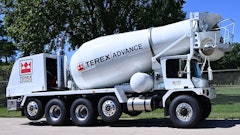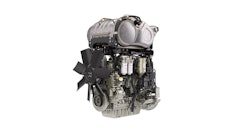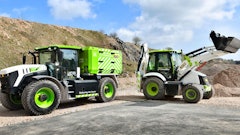
A sizeable fleet of Grove cranes is busy helping to construct the world’s third-largest hydroelectric project: the Belo Monte Dam, in Para, Brazil. Located along the Xingu River, the new dam will produce an expected 11,000 MW of power, making it the second-largest source of hydroelectric power for the country.
On the job are 14 Grove RT540E cranes, four Grove RT890E cranes, three Grove RT765E-2 cranes and two Grove RT9130E-2s. The cranes are dispersed among the project’s four job sites. All of these rough-terrain cranes are configured with both the main and auxiliary hoists and jibs.
The Grove RT540E cranes offer a capacity of 35 t (40 USt) and a maximum tip height of 47 m (154 ft.). The Grove RT890E cranes provide a capacity of 80 t (90 USt) and a maximum tip height of 73 m (238 ft.).
The Grove RT765E cranes bring a 60 t (65 USt) capacity and 36.4 m (119 ft.) maximum tip height to the job site, and the Grove RT9130E-2 cranes feature a 120 t (130 USt) capacity and 85 m (279 ft.) maximum tip height. Each crane is performing general heavy lifting for the variety of tasks required to construct the dam.
Also on the job site, four 9.5 t (10.5 USt) capacity Grove Yardboss YB4411 industrial cranes are assisting in the maintenance of the more than 1,000 machines on site, including earth movers, cranes, trucks and forklifts. This crane offers 11.6 m (38 ft.) maximum tip height and a compact footprint, which enables it to fit into tight working quarters.
The Belo Monte Dam project is so large and is located in such a remote area that the crane’s first project is to build factories that will make the tools needed for the dam’s construction. One such task was to help construct a concrete factory located directly on the job site. The factory will produce concrete that will fill the walls and other structural sections of the dam.
A conglomerate of 10 construction companies, the Consórcio Construtor Belo Monte, CCBM, is building Belo Monte Dam. The companies include Andrade Gutierrez, Camargo Corrêa, Odebrechet, Queiroz Galvão, OAS, Contern, Galvão, Serveng, J. Malucelli and Cetenco.
Gustavo Attencia, CCBM engineer, explained how pleased the construction teams have been with the cranes, which are working in challenging conditions.
“The Grove cranes are performing really well on this tough job site,” Attencia says. “The terrain where the cranes are working is extremely rough and the streets are narrow. The 4x4 drive mode and the four steering modes (front, rear, crab and coordinated) are not only must-have features, but also make the cranes’ operation much easier on the job site. Also, the Yardboss’s compact shape and flexibility are perfect for work on maintenance areas.”
Due to the size and nature of the project, a Manitowoc Crane Care branch has been built on the job site for added efficiency. Well-stocked with parts and knowledgeable technicians, the Crane Care team has ensured crane operations have run smoothly.
Claudio Marquetti, Corporative Equipment Manager for CCBM, says the cranes are well-suited to the challenging nature of the job site and have performed with excellence.
“With so many cranes working at the same location, you might expect a few problems,” he says. “However, the cranes have been running smoothly. Manitowoc cranes are quality, hard-working machines that are easy to run, maneuver and repair. For such a huge project, we feel confident that we made the best choice possible by choosing Manitowoc cranes.”
The dam will help support sustainable energy growth in Brazil to meet surging demand. The energy generated by the Belo Monte Dam will serve 18 million new homes, or 60 million people. An ambitious poverty reduction effort in Brazil over the last ten years has made the generation of sustainable energy a priority. The project began in 2011 and is due to finish in 2019. It will cost an estimated $18.5-billion.
The cranes were supplied to CCBM by Manitowoc Cranes Brazil.


























